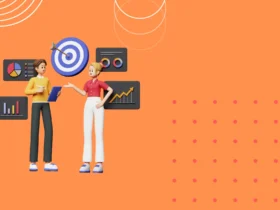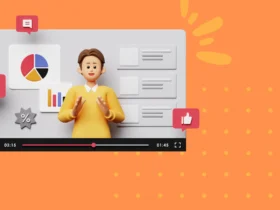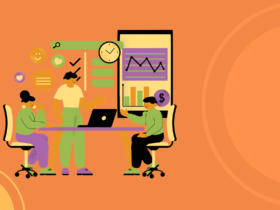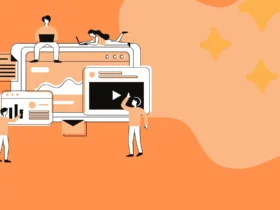When it comes to content marketing, creating awareness is only half the battle. The other half is converting that awareness into sales. That’s where the B2B content marketing funnel comes in. It’s a roadmap that helps businesses take potential customers from initial discovery through to conversion and beyond. But what exactly is a B2B content marketing funnel? And why is it so important for your business?
In this blog post, we will dive deep into everything you need to know about B2B content marketing funnels. We’ll discuss why they’re important for brand awareness, lead generation, and conversions. We’ll also explore the different stages of a B2B content marketing funnel and provide tips on how to create a successful one for your business.
Lastly, we will compare the differences between B2B and B2C funnels so you can create the most effective strategy for your target audience.
What is a B2B content marketing funnel?
Introducing a B2B content marketing funnel is crucial for guiding potential clients from initial awareness to successful conversion. The funnel comprises three stages – awareness, consideration, and decision – with each stage requiring specific content.
The top-of-funnel content is designed to capture attention and generate brand awareness, while middle-of-funnel content provides more detailed information on pain points. Finally, bottom-of-funnel content offers solutions and aims to facilitate conversion by providing clear calls to action.
By creating targeted content for each stage of the funnel, marketers can improve their chances of securing conversions and nurturing long-term relationships with clients.
Understanding the Buyer’s Journey
The buyer’s journey is a crucial aspect of the B2B content marketing funnel. It is the process that potential customers go through from the moment they become aware of their problem to making a purchase decision. The journey consists of three stages: awareness, consideration, and decision, each with its own unique challenges and opportunities.
In the awareness stage, prospects identify their problem or pain point and begin to research possible solutions. During consideration, they evaluate different providers and weigh the pros and cons of each. Finally, in the decision, they make a purchase decision based on factors like price, value, and customer service.
By understanding the buyer’s journey and tailoring content to meet their needs at each stage, businesses can guide prospects toward conversion and build stronger relationships with customers over time.
Defining the content marketing funnel
The concept of a content marketing funnel is essential for businesses looking to attract, engage and convert leads into loyal customers. Defining the funnel involves creating a framework that guides potential clients from initial awareness through to retention and expansion. The content marketing funnel comprises four stages: awareness, consideration, decision and retention.
At the top of the funnel, businesses create informative and educational content to attract potential customers. In the middle of the funnel, businesses concentrate on providing more detailed information to help leads evaluate their options and make informed decisions. Finally, at the bottom of the funnel, targeted content encourages leads to take action and become loyal customers while retaining them over time.
By understanding each stage of the funnel, businesses can develop a content strategy that aligns with their goals and maximizes conversions.
Importance of having a B2B content marketing funnel
Starting with an interesting fact, having a B2B content marketing funnel is crucial for businesses looking to attract and convert leads into customers. According to Content Marketing Institute, B2B marketers who have documented content strategies are more effective than those without one.
A well-crafted content marketing funnel helps businesses understand their target audience’s needs and create tailored content that addresses their pain points at each stage of the buyer’s journey. As a result, businesses can generate more leads, increase brand awareness, and ultimately drive conversions.
Without a proper funnel in place, businesses risk missing out on potential customers who may not have even been aware of their brand in the first place. Therefore, it’s essential to prioritize creating a successful B2B content marketing funnel to stay competitive in today’s market.
Brand Awareness
Creating brand awareness is a crucial first step in the B2B content marketing funnel. Your potential customers need to know who you are and what you offer before they can consider doing business with you.
One way to build brand awareness is by creating high-quality, informative content that provides value to your target audience. This content can take many forms, such as blog posts, social media updates, infographics, and videos.
Social media platforms are excellent tools for promoting your content and reaching a wider audience. By sharing your content on social media, you can increase your brand’s visibility and engage with potential customers.
Measuring the success of your brand awareness efforts is also essential for optimizing future campaigns. Metrics like website traffic, social media engagement, and lead generation can help you understand which types of content resonate with your target audience and adjust accordingly.
Build Authority
In the current digital landscape, building authority through content marketing has become a crucial prerequisite for establishing your business as a thought leader in your industry. By providing valuable and informative content, you can position your brand as a reliable source of information for potential customers.
This also helps build trust and credibility among your target audience, which is integral to nurturing long-term customer relationships. To ensure that your content marketing funnel effectively builds authority, it’s essential to create high-quality content that addresses the pain points of your target audience at every stage of their buyer’s journey. The right strategy can help drive conversions and lead to long-term success for your business.
Improving lead generation
A successful B2B content marketing funnel is designed to generate leads for your business by providing valuable information at every stage of the buyer’s journey. However, creating content that resonates with your target audience and drives conversions can be challenging.
To improve lead generation, B2B businesses must focus on creating content that addresses the pain points of their target audience and offers viable solutions. This requires using targeted keywords and SEO strategies to attract the right audience to your content.
Tracking and analyzing data on the performance of your funnel can help you identify areas for improvement and optimize your lead-generation efforts over time.
Strengthening the buyer-seller relationship
To build strong and lasting relationships with potential B2B customers, a content marketing funnel is an effective tool. By guiding customers through each stage of the buying process, businesses can establish trust and credibility. Educational content at the top of the funnel helps build brand awareness and set the groundwork for establishing authority.
Providing more personalized content in the middle of the funnel can help address specific pain points and create a connection with potential buyers. At the bottom of the funnel, targeted content can drive conversions and close deals.
By targeting different stages of the funnel, businesses can strengthen their relationships with buyers and increase their chances of converting them to long-term customers.
Increasing conversions
A successful B2B content marketing funnel is designed to guide potential customers through the buying process, with the ultimate goal of increasing conversions and driving more revenue. To achieve this, businesses must tailor their content to the specific needs and challenges of their target audience at each stage of the funnel.
Top-of-funnel content should focus on awareness and education, middle-of-funnel content should provide more detailed information about products or services, and bottom-of-funnel content should be designed to convert leads into paying customers through targeted offers and calls-to-action. By tracking and analyzing the performance of their funnels, businesses can optimize for conversions and drive success.
Stages of a B2B content marketing funnel
The B2B content marketing funnel involves several stages that help guide potential customers towards conversion.
The first stage is discovery, where prospects become aware of your brand and are introduced to your content. At this stage, it’s essential to create educational and informative content that captures the audience’s attention and establishes your brand as a credible source of information. The second stage is consideration, where prospects evaluate your brand and consider whether it’s a good fit for their needs. This is an opportunity to provide more personalized content that addresses specific pain points and establishes a connection with potential buyers. Finally, the conversion stage is where prospects make a decision and become customers. This is where targeted content can drive conversions and close deals.
Retention and advocacy follow after conversion, which involve nurturing customer relationships and leveraging them to expand reach and build credibility in the market. By understanding each stage of the funnel, businesses can tailor their content strategies to effectively guide prospects through the buying process.
Stage 1: Discovery
In the B2B content marketing funnel, the discovery stage is the first step in engaging potential customers. At this stage, prospects become aware of your brand and begin to explore your content.
To attract your target audience, it’s crucial to understand their pain points and create relevant content that resonates with them. One effective way to do this is by crafting blog posts, creating social media campaigns and optimizing for search engines.
By tracking metrics such as website traffic and social media engagement, you can measure the success of your discovery efforts and make necessary adjustments to optimize for better results. Overall, the discovery stage sets a solid foundation for engaging with your target audience and building awareness around your brand.
Stage 2: Consideration
During the consideration stage, potential customers are evaluating different solutions to their problem. To stand out from competitors, it’s crucial to tailor your content to the specific needs and pain points of your target audience.
Educational and informative content such as case studies, product demos, and expert guides can help move prospects toward a purchasing decision. Additionally, incorporating social proof such as customer testimonials can add credibility to your brand. Clear calls-to-action that encourage further engagement with your brand should also be provided at this stage.
By providing valuable content that resonates with your audience’s pain points and interests, you can increase the likelihood of converting prospects into customers.
Stage 3: Conversion
The conversion stage is the ultimate goal of your B2B content marketing funnel. At this point, prospects are ready to make a purchase or take another desired action. To ensure success, it’s important to have a clear understanding of your target audience’s needs and preferences.
Providing valuable and relevant content that meets those needs can help move them toward a purchasing decision. Clear calls-to-action are also essential in this stage to encourage further engagement with your brand. By continuously analyzing and optimizing the performance of your content marketing funnel, you can increase conversions and drive more revenue for your business.
Stage 4: Retention and Expansion
The retention and expansion stage of the B2B content marketing funnel is critical to maintaining a long-term relationship with your customers. By providing ongoing value through personalized experiences, exceptional customer service, and relevant content, you can keep your customers engaged and encourage them to continue doing business with your company.
This stage also presents an opportunity for you to expand existing business relationships by cross-selling or upselling additional products or services. Ultimately, focusing on retention and expansion can lead to increased revenue and customer loyalty, as satisfied customers are more likely to refer others to your brand. As such, it’s essential to track customer satisfaction and engagement metrics continuously and adjust your strategy accordingly to ensure success in this final stage of the funnel.
How to create a successful B2B content marketing funnel
Creating a successful B2B content marketing funnel requires a strategic approach that aligns with your audience’s needs and pain points. It starts with understanding your target audience and their buyer’s journey, then crafting high-quality content that speaks to each stage of the funnel – from awareness to decision.
Additionally, utilizing SEO best practices and investing in paid promotion can expand the reach of your content, while monitoring and analyzing performance can help optimize the funnel over time. By mapping content to each stage of the funnel, analyzing and optimizing its performance, and integrating it with other marketing channels, you can create a successful B2B content marketing funnel that drives conversions and improves customer retention.
Mapping content to each stage of the funnel
To effectively guide leads through each stage of the B2B content marketing funnel, it’s crucial to map specific types of content to each stage.
Top-of-funnel content should prioritize brand awareness and attract new leads to your website through blog posts and social media updates. Middle-of-funnel content should focus on educating your leads about your products or services and building trust with them through webinars or case studies. Bottom-of-funnel content should concentrate on converting leads into customers through targeted messaging and calls to action.
By mapping relevant content to each stage, you can ensure a streamlined buying process that effectively guides potential customers toward conversion.
Analyzing and optimizing the funnel’s performance
To ensure the success of your B2B content marketing funnel, it’s essential to analyze and optimize its performance regularly. This involves measuring key metrics such as conversion rates, time spent on each stage, and click-through rates.
A/B testing different types of content and personalizing messaging for each stage can help determine what works best for your target audience. By fine-tuning your funnel based on performance data, you can identify areas for improvement, increase engagement, and ultimately drive conversions.
Remember to regularly review and update your funnel to stay ahead of the curve and maintain long-term success.
Integrating with other marketing channels
In today’s digital age, integrating your B2B content marketing funnel with other marketing channels is crucial for maximum effectiveness. Utilizing social media platforms, email marketing, and paid advertising can drive traffic to your content and improve engagement with your target audience. It’s important to ensure that messaging across all channels is consistent and supports the next step in the funnel.
Marketing automation tools can help manage and track your funnel across multiple channels, while regular analysis of its performance can identify areas for improvement and optimize its effectiveness. By integrating your funnel with other marketing channels, you can expand your reach and increase the chances of converting leads into customers.
How is the B2B funnel different from the B2C funnel?
B2B and B2C marketing funnels differ vastly, reflecting the unique needs of each type of customer. Unlike B2C buyers where an individual’s purchasing decision is influenced by a few factors like emotions and price points, B2B purchases are long-term commitments that require research, consensus building, and approval from multiple stakeholders.
As such, it’s essential to tailor content for each stage of the funnel to reflect this complex decision-making process. B2B content should be more educational and informative rather than promotional to address pain points and provide solutions for businesses.
While the B2C funnel may focus on impulsive buying decisions, the B2B funnel requires different types of content at each stage, such as whitepapers or case studies.
Conclusion
A B2B content marketing funnel is a powerful tool that can help businesses convert leads into customers. By understanding the buyer’s journey and defining the stages of the funnel, you can create impactful content that resonates with your target audience.
Not only does it help in building brand awareness and authority, but also converting leads into paying customers by strengthening the buyer-seller relationship. To create a successful B2B content marketing funnel, it’s important to map content to each stage of the funnel, analyze and optimize its performance, and integrate it with other marketing channels.
While there are similarities between B2B and B2C funnels, the key difference lies in the complexity of decision-making involved in a B2B purchase. To learn more about mastering the content marketing funnel, download our comprehensive guide now.



![How to Create an Email Drip Campaign for B2B [+ Best Practices]](https://marketingmojo.blog/wp-content/uploads/2023/04/How-to-Create-an-Email-Drip-Campaign-for-B2B-Best-Practices-1-280x210.png)






Leave a Reply